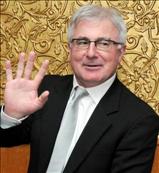A Free Trade Agreement (FTA) between India and New Zealand could become a reality as early as next year, with the Governments of both countries determined to resolve outstanding issues and promote closer cooperation.
India’s Commerce & Industry Minister Anand Sharma gave a broad indication of his Government’s willingness during his three-day visit to New Zealand last week, which included meetings with Prime Minister John Key, Agriculture Minister David Carter, his principal host and counterpart Trade Minister Tim Groser and a number of businesspersons.
 “We hope to sign the Agreement in early 2012,” he said, addressing a meeting of the India New Zealand Joint Business Council at Langham Hotel on May 9.
“We hope to sign the Agreement in early 2012,” he said, addressing a meeting of the India New Zealand Joint Business Council at Langham Hotel on May 9.
His speech and that of Mr Groser belied fears that the discussions on several thorny issues will be protracted and frustrating.
Mr Groser is a master negotiator and would be able to fast track the Agreement when it reaches the ministerial level.
“New Zealand is an important trade partner for India. We are hopeful that a FTA will be signed early next year, paving the way for greater economic cooperation and investment. While the First Green Revolution (1968) made us self-sufficient in the production of food grains, we are now embarking on the Second Revolution to provide us the surplus for export. We should be able to export not only food grains but also fruits and vegetables,” he said.
Investment free flow
New Delhi has relaxed almost all regulations concerning Foreign Direct Investment (FDI) including the oppressive License Raj, blending all the procedures into a simplified system of administration. In addition, State Governments have also become proactive and are vying with each other in providing incentives for international corporations to establish their presence.
“Although primarily an agricultural country, with a majority of our people engaged in farming for livelihood, productivity is low. We need to upgrade our technology and look forward to the cooperation of technically advanced countries like New Zealand,” he said.
Underscoring India’s penchant for FDI in a broad spectrum of agriculture and industry, Mr Sharma identified a number of sectors, which warranted immediate attention. These included agri-processing, food processing, post-harvest technology transfer in refrigeration, cold chains, storage and logistics for minimising post-production losses.
Patton scores
Apart from a number of New Zealand companies that have already established trade links, a number of others including Patton New Zealand Limited should be able to add value to a free trade pact. Patton’s Chief Executive Sameer Handa reportedly assured Mr Sharma that his company would be able to assist India with its expertise in refrigeration.
As reported earlier (Indian Newslink September 15, 2010) the Company is finalising plans to establish a $50 million manufacturing plant in India.
Wenceslaus Anthony, Chair of the India New Zealand Business Council (INZBC), which organised the Joint Business Council Meeting with the Delhi based Federation of Indian Chambers of Commerce and Industry (FICCI) said both Governments now recognised the Council as a significant partner in promoting bilateral trade and investment.
He said ANZ Bank, which was involved in the establishment of the INZBC in 1988 has been a consistent supporter of the organisation, hosting important meetings, including those of the Joint Business Council in New Zealand and India.
“All the advanced countries today want to establish closer ties with India, which accounts for the world’s largest working population (402 million), the 12th largest consumer market (poised to climb to the fifth position by 2025) and 23 million high net worth individuals, surpassing the entire population of Australia,” Mr Anthony said.
He said there was also a need for exchange visits by the Prime Ministers of New Zealand and India, accompanied by a strong business delegation.
Among those who attended the meetings were India’ High Commissioner Retired Admiral Sureesh Mehta, National Party MP Kanwaljit Singh Bakshi, top officials of the two Governments, FICCI Chief Financial Officer Robin Banerjee and a 30-member delegation from India.
Mr Groser was upbeat after sending off his guest.
“We place great importance to strengthening our economic as well as bilateral relationship with India and hope that the new economic agreement will give it further impetus. The FTA is an exciting prospect. It will provide a framework for our trade and economic links to reach that potential,” he said.






